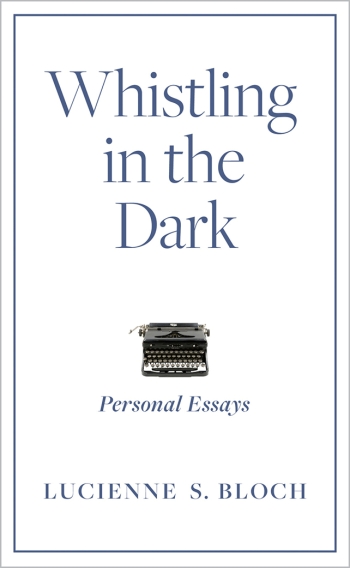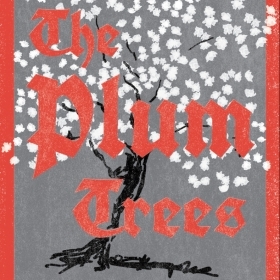In her collection of personal essays, Whistling in the Dark, Lucienne Schupf Bloch ’59 seems always on the move: walking around the Central Park Reservoir; driving up to Westchester, N.Y., to shop for a burial plot; circumambulating her parents’ past—from Vienna to Singapore to Antwerp and ultimately to Manhattan, her home for more than three-quarters of a century. Her mind is equally far-ranging. In the 19 essays collected here, many previously published in literary journals, she ruminates on family, dislocation, and belonging, on dying and becoming. Luckily for us, she has invited the reader along for the journey.
Born in Antwerp, Belgium, Bloch was an infant when her parents fled Hitler’s advance for the safety of Manhattan, although they don’t seem to have found solace there. As a young person, she longed for details about what had happened to the dark-robed men and dark-wigged women from their family photos. “There was occasional mention of roundups, selections, and showers, whispers usually, muffled inside information punctuated by omissive ellipses, hesitational dashes, and full stops of wordless despair,” she writes.
The silences in Bloch’s childhood created a vacuum she tried to fill, mainly with words. A native French-speaker, she imagined that mastering English might be her “exit visa from fear and foreignness,” she writes.
She transformed herself into a master stylist—her sentences are complex, sonorous, multi-layered—and many of these essays touch on the power of language. One is a riff on those word-a-day calendars: each esoteric noun or adjective a diving-off point into the free-associative waters of memory. Another chronicles her father’s long, slow decline into Alzheimer’s. His loss of language terrified her. He had once been a cosmopolitan diamantaire, or diamond seller, conversational in no fewer than seven.
One catches only oblique references to her family’s role in Manhattan’s secretive diamond trade and to the extended European clan that cast such a long shadow over her life. Yet some of the most vivid and absorbing moments in these essays come when she digs deep into family history, whether her mother’s cultured Viennese upbringing, or her own childhood visits to an impoverished elderly relative, “Mrs. Palatschinke,” for whom “one blue chair was an elegant salon, a plateful of palatschinken was a soup-to-nuts dinner party.”
Other surprising passages in this collection examine Bloch’s long, winding path to becoming a writer: a discouraging solo trip to Paris in her youth; disappointing stints at New York literary agencies; and then a couple of decades spent in the “primordial soup of daily mothering.” But unlike so many mother/writers of her generation—indeed of any generation—she expresses no regrets. Motherhood was her “chosen career” and “a paradise of innocence waiting to be lost, in time and inevitably.”
After her three children left home, she put pen to page in earnest. An attempt to write a family history for her children became her first novel, On the Great-Circle Route. A second, Finders, Keepers, followed. In the latter half of her life, she has found fullness where once there was absence: of family and place, and words, words, words.
Ligon is a writer and mother of four young children. She lives in Oxford, Miss., where she will begin an M.F.A. in creative writing at the University of Mississippi this fall.








We ask that those who engage in Wellesley magazine's online community act with honesty, integrity, and respect. (Remember the honor code, alums?) We reserve the right to remove comments by impersonators or comments that are not civil and relevant to the subject at hand. By posting here, you are permitting Wellesley magazine to edit and republish your comment in all media. Please remember that all posts are public.